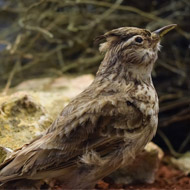‘Catastrophic’ fall in French bird populations

Eurasian Skylark populations in the French countryside have fallen by a third.
Bird populations in the French countryside have fallen by a third in 15 years, according to new research.
Results of two studies led by France’s Museum of Natural History and the National Centre for Scientific Research (CNRS) show that a number of species have seen a fall in numbers, in some instances by as much as two-thirds.
Conservation biologist and study co-author Benoit Fontaine described the situation as “catastrophic”, adding that the countryside “is in the process of becoming a veritable desert.”
The Eurasian Skylark, the common white throat and the ortolan bunting are among the species that have seen a fall of a third. In the case of the meadow pipit, populations have fallen by almost 70 per cent.
Researchers believe the main cause of the decline is the intensification of agricultural practices. Whilst the birds themselves are not being poisoned by pesticides, the insects they feed on have vanished.
“There are hardly any insects left, that’s the number one problem,” CNRS ecologist Vincent Bretagnolle told The Guardian. “What is really alarming, is that all the birds in an agricultural setting are declining at the same speed, even ‘generalist’ birds,” which also thrive in other settings such as wooded areas.
That shows that the overall quality of the agricultural eco-system is deteriorating.”
The research, which was carried out by professional and amateur birdwatchers, shows that the decline further intensified in 2016 and 2017.



 The latest
The latest